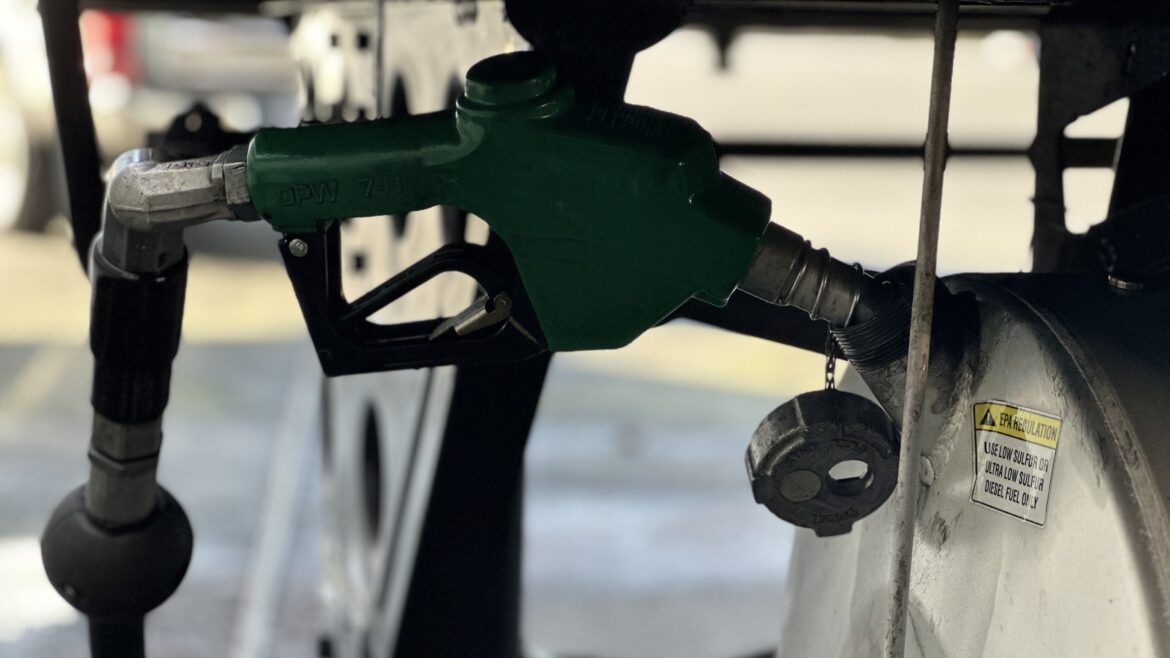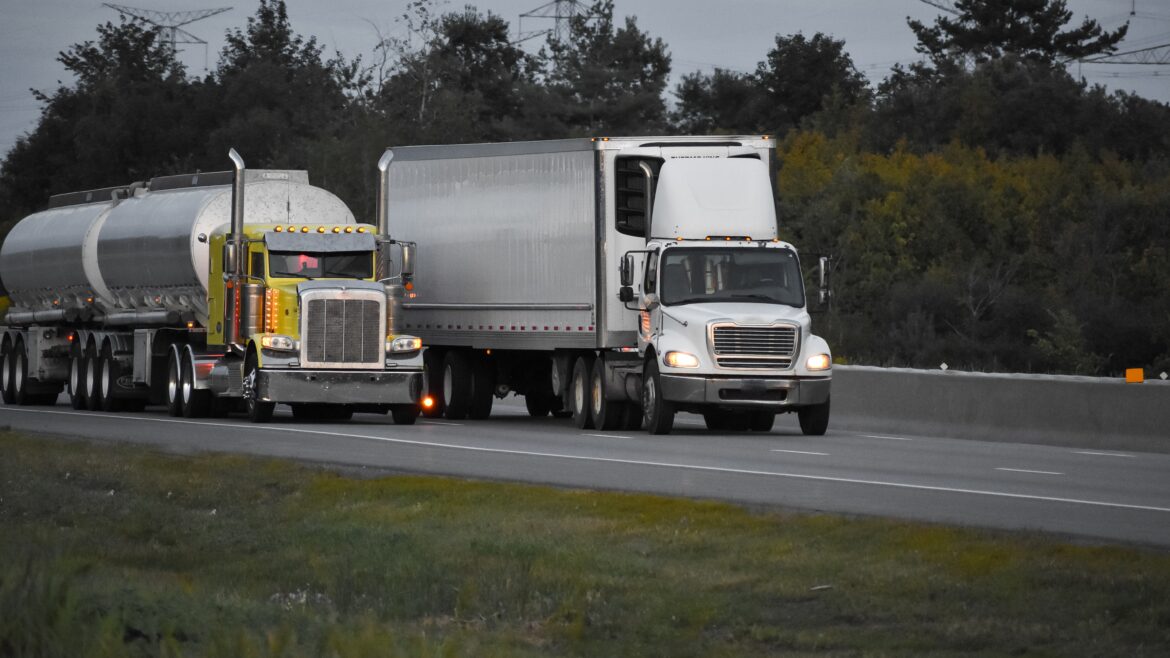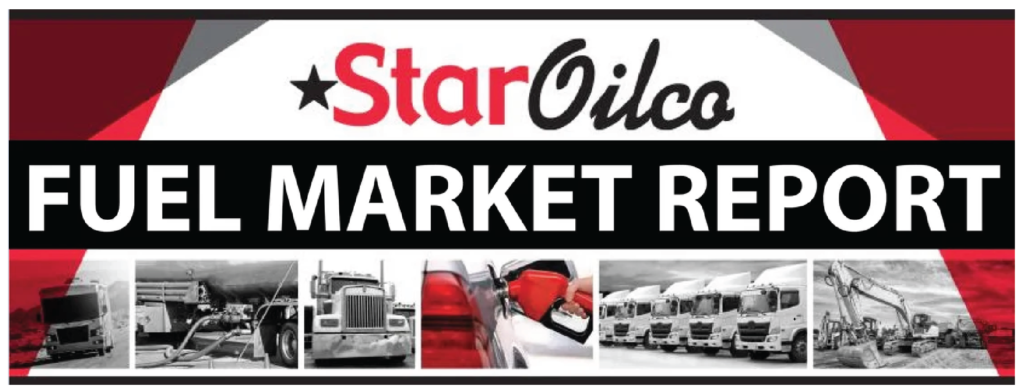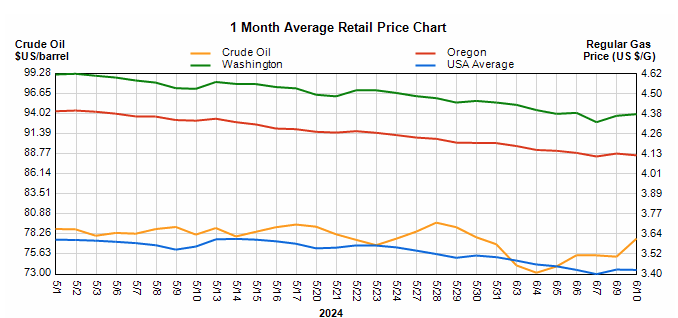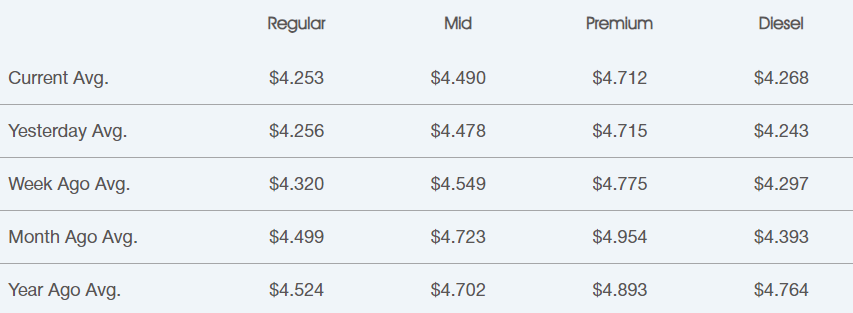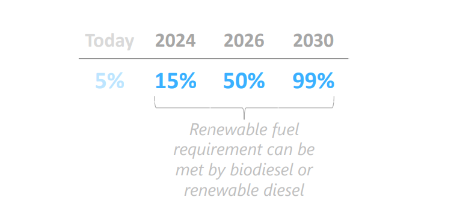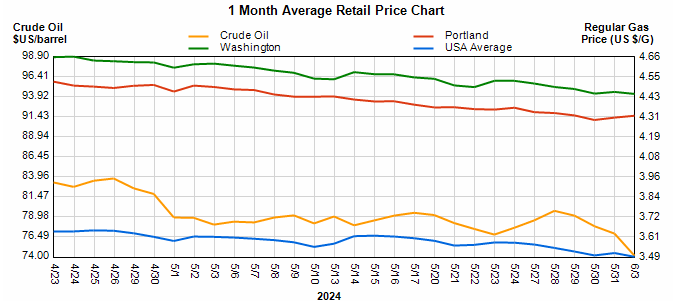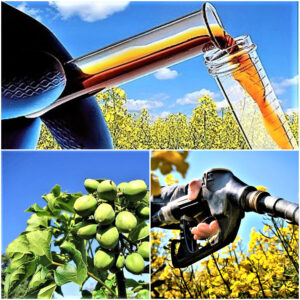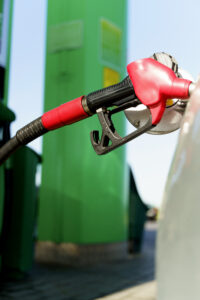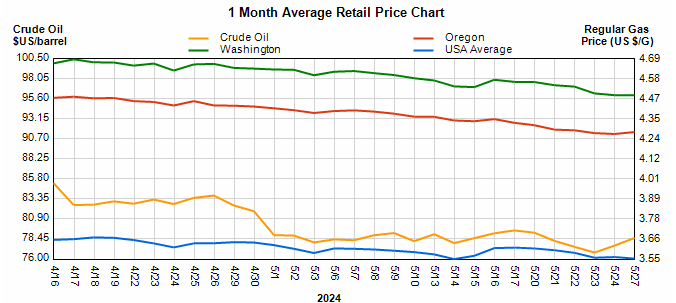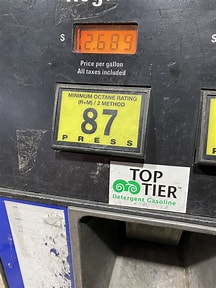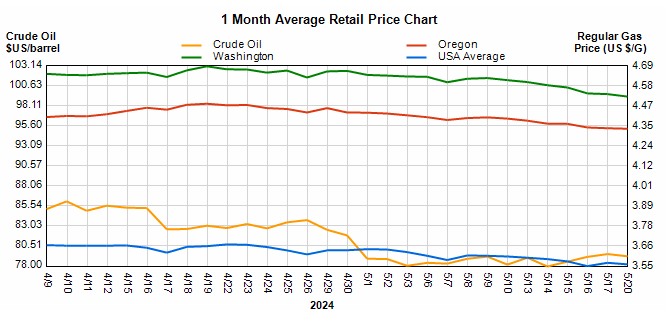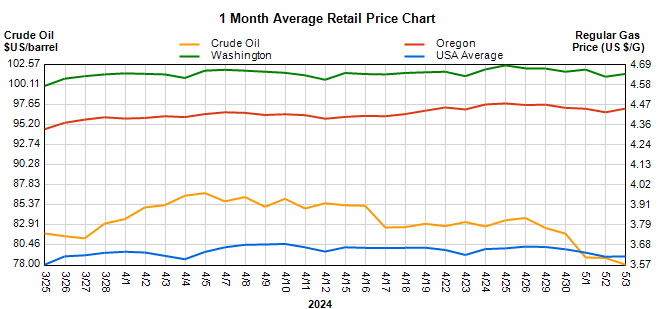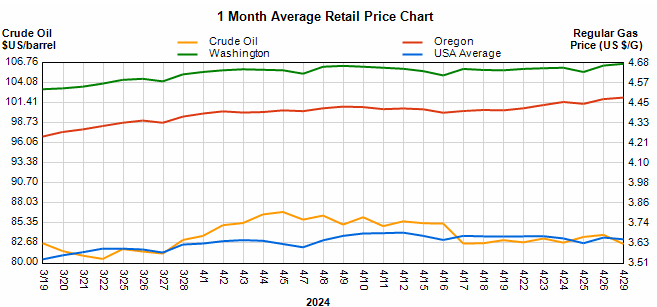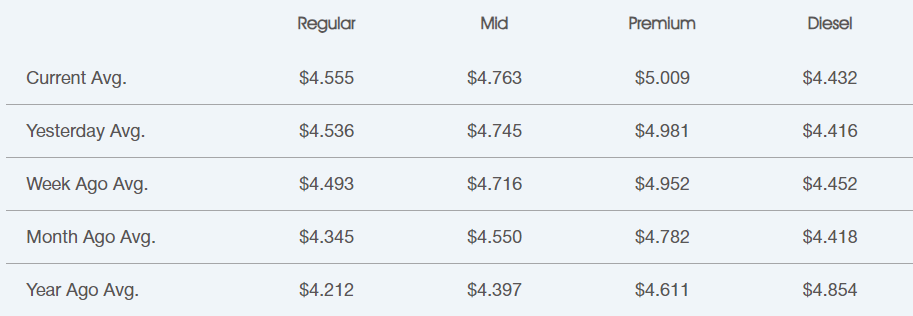Every Question About Off-Road Diesel
Got questions about red dyed diesel? We have answers!
If you don’t find the answer you’re looking for related to red dyed diesel (or off-road diesel) reach out to us directly and we’d be happy to help answer your questions.
Red Diesel is off-road diesel, in the United States this fuel is denoted with a red dye. The dye marks this as fuel for off-road equipment and vehicles and as such it doesn’t have road fuel taxes included in the price. This dye takes a great deal of clear fuel to dilute so it makes it very obvious if an on-road vehicle has been using off-road untaxed fuel. Tax authorities can and do check for vehicles using off-road red diesel in on-road vehicles. They do this by using a black light to spot any residual presence of dye in the fuel as well as at key places in the engine compartment.
On-road diesel is clear or slightly green. Refineries place a green dye into diesel fuel which is obvious if fuel is freshly dispensed into a bottle to observe its color. As fuel ages this dye fades to yellow or darker colors. Part of a visual observation to inspect diesel fuel quality is to check the fuel for a “bright” appearance with the slight green dye being a giveaway that the diesel is fresh and in good condition.
Nearly all diesel has dye in it. Typically when talking about dyed diesel, we’re referring to a red dye added to off-road diesel. Off-road diesel is normally used for heating oil, construction fueling, agricultural use, and other off-road equipment not used on the highway system where fuel taxes would be required by law.

Why is diesel dyed?
Diesel is dyed in order to denote if it has paid road tax or not. On-road diesel in the United States usually has a light green tint to it. Off-road diesel has a red dye to denote it has not paid road taxes as required by all states and the Federal government.
What is off-road diesel?
Off-road diesel is diesel fuel dyed red to show it is untaxed and available only for off-road fuel uses such as construction fueling, equipment never used on a public road, agricultural use, heating oil, boiler fuel, and other non-taxed diesel fuel uses under state and Federal fuel tax law. In Oregon, with proper paperwork, some off-road uses can buy on-road fuel with the Oregon state tax exemption.
What is farm diesel?
Farm or diesel for agricultural use is off-road diesel that is not charged on-road fuel taxes. Agricultural use fuel is a tax-exempt use of diesel fuel. If diesel is burned on a farm and can be tracked for such, taxes can be avoided. Farms are allowed to receive clear diesel without road taxes charged on it in Oregon. Often it is dyed red to denote it is tax free. In Oregon, where P.U.C. for trucks over 26,000 GVW pay a weight mile tax instead of a per gallon state road tax, some farms will track their use of clear diesel so they can file for Federal road taxes on off-road usage.
Contact Us Today To Order Your Off-Road Diesel
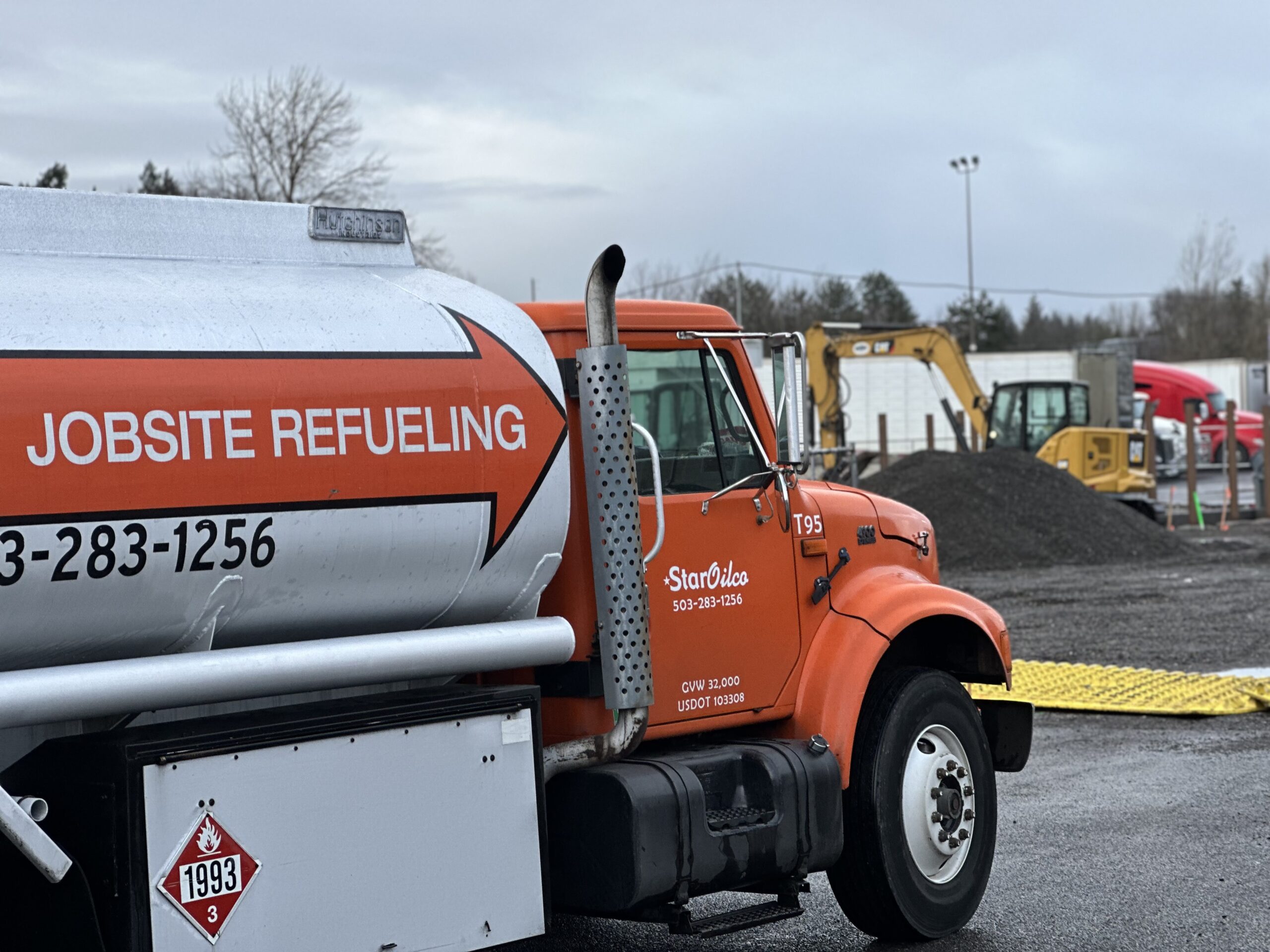
All diesel sold in the United States typically has some dye in it. On-road diesel usually has a slight green tint to it. This is a dye added by either the refiner or terminal provider with the fuel. Off road diesels are dyed red to denote that the fuel is untaxed and is for use in off-road purposes only.
Solvent Red 26 and Solvent Red 164 are the allowed dyes prescribed by the United States Internal Revenue Service for marking diesel as for un-taxed off-road use only.
Off-road diesel is classified as a Class II combustible liquid by the National Fire Code. A flammable fuel is one with a flash point below 100 degrees F. Diesel’s flash point is between 126 and 205 degrees F (typically assumed to be about 160 degrees F). That classifies it as a Class II combustible.
Fuel taxes charged is the big difference between the two fuels. All on-road diesel is clear or greenish in color to denote it is both ultra-low sulfur diesel and the on-road fuel taxes associated with using it to power a highway vehicle have been paid. Dyed fuel means that fuel taxes are not paid and that the fuel can not be used to power a vehicle on a public road.
It depends on the sulfur content of the fuel and the year/engineering of the truck. If your dyed fuel is ultra low sulfur it is typically the exact fuel as on road diesel with an added injected red dye to denote it is untaxed for off road use only.
Red Dyed fuel can occasionally be low sulfur or high sulfur content. That sulfur content will create real issues with a post 2007 pick up or commercial diesel truck with a tier 3 or tier 4 emission system. Most diesel in the US today including off-road diesel is ultra low sulfur (under 15 ppm sulfur). Low sulfur diesel is over 15 parts per million and can be as high as 500 ppm. High sulfur diesel is over 500 ppm and can range in the thousands of parts per million. That sulfur means far more soot and black smoke out of your tail pipe. If you are “rolling coal” out of a modern diesel that’s bad for the truck as well as violates emissions laws in the US. Similarly if you are using a 2007 or newer truck it will have very tight tolerances on the fuel injectors which can more easily coke up if running a higher sulfur or even dirtier specification diesel. It is recommended to use ultra low sulfur fuel in all equipment.
It is illegal because diesel used for on-road use has taxes to pay for those roads. These taxes are charged at a federal, state, and municipal level depending on where you are at. Off road diesel has a red dye injected into it at the time of loading the fuel delivery truck. This loading of a fuel truck at a terminal is the point of taxation and tracking for diesel down stream in the economy. If you see a fuel with a red dye, it is untaxed. To use this in an on-road vehicle if you get caught can result in huge fines. In Oregon it could be as much as $10,000 a day for use of red dyed diesel in an on road use. It is not uncommon for scale stops of commercial tanks to flashlight a saddle tank and check for any evidence of dye in fuel at a DOT scale stop.
Is off-road diesel or dyed diesel high sulfur diesel?
Dyed diesel (or off-road diesel) can be high sulfur fuel. High sulfur diesel is defined as diesel fuel with over 500 parts per million of sulfur content.
Is off-road diesel or dyed diesel ultra-low sulfur diesel?
Off-road and dyed diesel fuels can be ultra-low sulfur but are not guaranteed to be. There has been a consistent push to reduce sulfur in all fuels in the United States as led by EPA regulation. In recent years, EPA standards require off-road construction and agricultural equipment to have an emissions system that allow ultra-low sulfur to operate without major problems. So today’s off-road diesel being delivered is ultra-low sulfur. If you have a tank with old stored dyed red diesel fuel in it, you can assume it has a higher than ultra-low sulfur content.
What is dyed ULSD fuel?
Dyed ULSD fuel is ultra-low sulfur diesel with a red dye in it to denote that it is for off-road or untaxed purposes only. These purposes are typically for heating oil, construction fuel, agricultural fuel, generator fuel or other off-road uses. The “ULSD” is an acronym for ultra-low sulfur diesel.
Dyed diesel can be either #1 or #2 diesel. Both fuels require a red dye in them to confirm they are untaxed and cannot be used for on road fuels.
Dyed diesel and off-road diesel can be kerosene (which crosses as #1 diesel fuel), but not necessarily. Do not assume a dyed fuel is kerosene, which is a rarer fuel. Kerosene is different than #1 diesel for one characteristic: its confirmed ability to be absorbed and taken up by a wick. All kerosene is #1 diesel. Not all #1 diesel fuels are kerosene. The same goes for dyed diesels and off-road fuels. All dyed kerosene is dyed and off-road diesel. Not all dyed fuel is kerosene.
Yes, dyed diesel and off-road diesel are stove oil. Typically a #1 stove oil or #2 stove oil, similar to diesel. Historically stove oils had a slightly different set of specification concerns which is why they were called “stove oils” versus diesel. When petroleum refineries distilled crude oils to get diesel range fuels, it was less exact than it is today with hydrocracking technology. Today with both oil refinery technologies and the EPA emission regulations, the number of distillate range fuel specifications is far more consolidated in order to ensure compliance with EPA and state rules. If your heating appliance is demanding stove oil, it typically needs a #1 stove oil or #1 kerosene product. This product is expected to produce less soot and therefore to work better in a pot stove type of application. The most modern stove oil appliance in the U.S. are Monitor and Toyostove thermostatically controlled direct vent heaters.
Depends on the year of your truck, and we assume you mean red dyed diesel fuel. First, using dyed diesel, off road diesel, or heating oil in an on-road vehicle is against the law. If you are caught in Oregon the fine can be as big as $10,000 and the State of Oregon does aggressively pursue this type of tax avoidance. Beyond the legal use of off-road fuel. Typically on the west coast dyed diesel is ultra low sulfur diesel. Which means it will not cause maintenance issues if burned in your engine. Dependent on the age of the dyed fuel, or if it is actually a heating oil, it might be high sulfur or low sulfur fuel. If you use that in a post 2007 engine with a particulate trap it will have serious maintenance issues if you use that fuel.
Yes, dyed diesel and off-road diesel are acceptably used as heating oil. Dyed diesel and off-road diesel these days are typically ultra-low sulfur diesel. Heating oil can be low sulfur or high sulfur in content under EPA and most state laws. So heating oil sometimes cannot be dyed diesel (when used for off-road equipment or agricultural use) but dyed/off-road diesel can always be used for heating oil and conform to the necessary specification required by heating oil furnaces.
Yes! But in today’s ultra-low sulfur market, most off-road diesel is below 15 parts per million. If your equipment requires ultra-low sulfur diesel, it is a good practice to confirm that is what fuel you are getting. Some low sulfur diesel (under 500 parts per million sulfur fuel) and high sulfur diesel (over 500 parts per million sulfur) is still in the marketplace used by heating oil, boiler systems, locomotive, and marine applications.
Off-road diesel gels at cold temperatures. At colder temperatures, wax crystals begin to form and fall out of the diesel, clogging filters and gelling up the fuel. Also, the water and naturally held-in diesel will ice up and obstruct filters. This phenomenon is called diesel gelling.
All diesel fuels will gel if it gets cold enough. Both a formation of wax crystals and ice forming in your fuel will obstruct filters and take your equipment down. Rule of thumb: with no treatment your diesel fuel should operate without any issues above 20 degrees Fahrenheit. Below 20 degrees Fahrenheit, you will want to ensure your vendor is treating the fuel for winter use to ensure it will operate down to -20 degrees Fahrenheit. If you are facing temperatures below that, you will want to confirm with your vendor that they are testing that fuel to operate below -20 degrees Fahrenheit.
Why does the government require diesel be dyed red?
From a informational pamphlet from the US IRS on untaxed fuel:
“The federal government requires dyeing of untaxed diesel fuel and kerosene for two reasons. To help reduce tax evasion by identifying fuel on which excise taxes have not been paid, and to help reduce air pollution by identifying fuel not suitable for use in highway vehicles.”
Does off-road diesel go bad?
Off-road and dyed diesel do age and can go bad. All diesel fuels adhering to ASTM specification should be safe for storage up to a year without additional treatment and testing. If you are storing diesel for long term use, it is a good best practice to treat the fuel with a biocide and oxidative stabilizer to ensure that the fuel stays within specification and nothing will begin to grow in your fuel tank. The biggest enemy of long term diesel storage is water and dirt entering the fuel through a tank vent. As temperatures change a tank will breath pulling in air and moisture from outside. Ensuring there is no water in the tank and that outside contaminants can’t get into a tank are how keep your fuel within specification.
Untreated, you can assume that diesel fuel is good for a year. If treated with a biocide to prevent biological growth from growing in the tank, you can expect diesel to be good for two to three years. After two to three years, diesel begins to show age as it loses its brightness when sampled. After three years you will want to sample and test the fuel to ensure it is within specification for reliable use.
Fuel taxes vary by state and sometimes even local municipality. With off-road diesel, usually the only taxes to consider are sales taxes on the fuel. In Oregon there are no taxes on dyed off-road fuel. In Washington state there are sales taxes for dyed-diesel charged on top of the sale price of the fuel. (NOTE: If you use clear diesel in Washington state there is no sales tax as the road tax is being charged.) If you are curious for a more in depth answer Star Oilco has a full explanation of Oregon Diesel Taxes (a unique system in the United States for local fuel tax collection of trucks over 26,000 GVW).
Yes. If you are consuming dyed diesel and are not paying for the on-road fuel taxes in Washington state, the sales tax is charged. If you use clear fuel with road taxes attached to the fuel, the sales tax is not charged. For more on Washington fuel taxes see the Washington Department of Revenue.
Your petroleum distributor has some small taxes (under $.01) attached to the fuel they buy at the wholesale terminal level. Those taxes being the U.S. EPA Superfund cleanup and the “LUST” or Leaking Underground Storage Tank cleanup fund. Beyond that, there are no taxes (Federal, state or local municipality) on fuel used for off-road diesel in Oregon state.
In Oregon you can buy clear fuel exempt of Oregon’s state road taxes. The qualifications for using clear diesel Oregon State tax exempt are the following:
vehicles issued a valid ODOT Motor Carrier permit or pass (weight receipt)
vehicles issued a valid Use Fuel User emblem by the ODOT Fuels Tax Group
vehicles registered to a US government agency, Oregon state agency, Oregon county or city, and displays a valid Oregon “E” plate
vehicles, or farm tractors/equipment only incidentally operated on the highway as defined in ORS 319.520
vehicles or equipment that are unlicensed and/or used exclusively on privately owned property
What happens if I use dyed diesel in an on-road vehicle?
If you get caught in Oregon, a $10,000 a day fine can be levied. We have seen fuel tax cheats get caught repeatedly so be aware Oregon is on the look out for any amount of dye in the saddle tank of an on-road vehicle. If the fuel you use is low sulfur or high sulfur fuel and your vehicle has a particulate trap, you will have maintenance issues with the emission system of your vehicle.
Only if that pickup is dedicated to an off-road use. If you plan to ever use that truck on a public road (even to cross a street), and dyed fuel is found in that vehicle, fines up to $10,000 per occurrence can (and are) levied by state regulators. If you have a closed facility or large farm and are not registering the vehicle for on-road use (so the pickup must not leave the site), you can use off-road diesel as the vehicle’s fuel. If you have license plates and it’s permitted for on-road use, any regulator spotting dyed fuel in that truck will presume it is an on-road pickup.
Typically when checking for illegal use of dyed fuel, regulators will sample from the tank or spin the fuel filter and observe for obvious dyed fuel. If the fuel is clear (or even slightly pink) and they suspect dyed fuel was used in the vehicle, they can apply a special black light that will glow an obvious color denoting dyed fuel had been in contact with the vehicle. They will shine that light on the filter, fuel tanks, and various parts in the engine compartment that would have come into contact with the fuel. If those areas denote even a mild trace of the red-dye used in off-road diesel, they will cite the vehicle operator. There are kits sold online for filtering dye out of fuel to remove the color. Those kits will not remove enough dye to avoid detection by these lights.
Off road diesel is dyed red to show that the on-road fuel taxes are not paid or that it is a tax-free fuel. The Federal Government and State Government’s have fuel taxes for on-road fuel usage to help pay for the roads we all drive on. If you are using diesel for a non-road equipment, machinery, or heating/boiler applications the fuel taxes are exempt and the fuel is dyed to ensure it’s tax free status is immediately seen. Regulators in a road side or site level inspection can also shine a black light on specific places in a vehicles system to denote if dyed fuel is being used in violation of the law as well.
In the Pacific Northwest at the current moment? Usually nothing. Heating oil is dyed diesel. Most petroleum distributors are selling the mainstream dyed diesel specification for use as heating oil in order to lower the overall cost of the fuel. There are different ASTM specifications for heating oil and dyed diesel dependent on the state you buy it in. Heating oil’s specification has wider tolerances than diesel specifications as furnaces and boilers can handle dirtier, lower quality fuels than off-road equipment with a particulate trap. Heating oil is always a diesel fuel, but sometimes dyed diesel for off-road equipment has a different specification than heating oil. For example, in Oregon a 5% biodiesel or 5% renewable diesel mandate exists for any dyed diesel fuel used in off-road equipment. This biofuel mandate exempts heating oil and boilers. So heating oil can be biodiesel free but off-road diesel for equipment cannot.
Get Your Off-Road Diesel Delivered Today
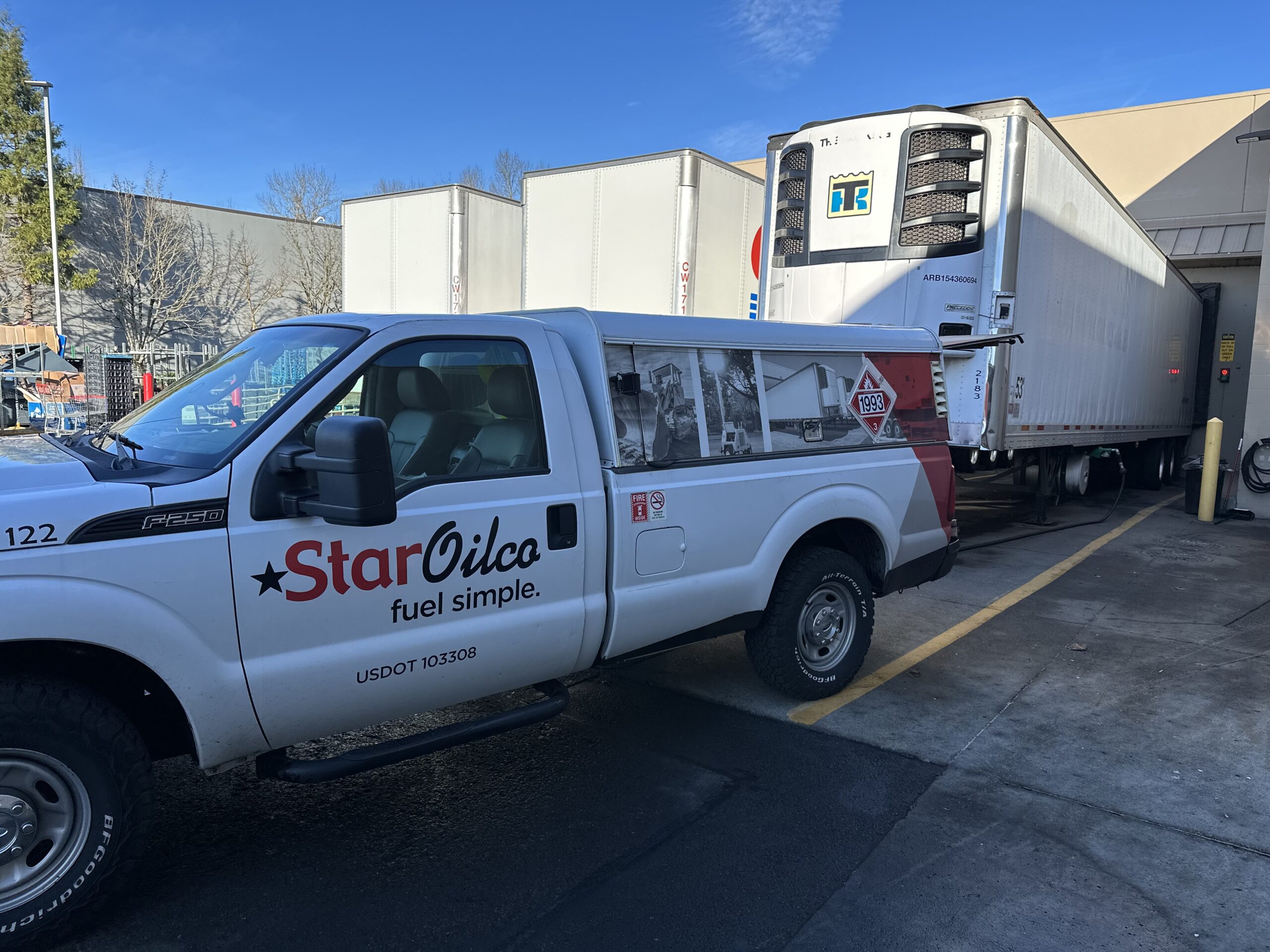
Can refrigerated trailers or “reefers” use dyed diesel even if they are attached to a truck moving it on the highway?
Yes, refrigerated trailers are off-road equipment. The diesel fueled refrigeration trailer is off-road equipment as its engine is not powering something actually driving down the road. These trailers can use any ultra-low sulfur diesel fuel (dyed or clear). If using on-road clear fuel in a refrigerated trailer, if you track and keep proof of the on-road fuel being used in the off-road piece of equipment, you can file for those fuel taxes back. Proof is required though so consult with your CPA or accountant.
The first step is to set up an account with Star Oilco. It’s easy to pay through a simple credit application or by placing a credit card on the account. Oregon and Washington are highly regulated when it comes to fuels such as diesel. We need to account for who is ordering and getting fuel (yes, Oregon even checks sometimes as the DEQ tracks every gallon of diesel moving into the state). Determine if you want a loaner tank onsite or a keep-full service plan. Star Oilco will deliver bulk or wet hose fuel your job site on a regular schedule. We are here to make it as easy as possible for you to focus on your project, not fueling. Let us know what you want: we will keep it simple and make it easy for you.
If you are storing off-road or dyed diesel for longer than six months you will want to make sure it is stabalized. Star Oilco recommends Valvtect Plus Six as the fuel additive you want to use. Our recommended fuel additive is a fuel microbiocide with stability additives made for diesel long term storage. This kills and prevents the growth of biological “hum-bugs” in your tank. Bacteria, yeast, and algae can grow in your fuel tank. Usually in a small amount of water that collects in the bottom of the fuel storage tank (be it the bulk tank you fuel out of or the saddle tank on your equipment).
There are several ways to do this. What you will want to do varies based on how much water and what it is in. If you are dealing with a large bulk fuel tank you want to definitely pump the tank bottom to get the water out. If you are seeing extreme biological activity (Hum-Bug growing in your tank) you want to do a kill dose treatment on that tank. It might not be a bad idea to also spend a few thousand dollars to have a professional tank cleaning company come in and manually clean the tank prior to adding the kill dose to kill anything growing in your tank. If it’s the tank on your equipment usually the best route is to drain the tank, flush the tank, and also put a kill dose of a fuel microbiocide to make sure nothing continues to grow. If you want to talk to someone feel free to call Star Oilco, you do not need to be our customer for us to walk through some solutions you can do yourself.
There are a very few rural gas stations that provide this fuel. Some Pacific Pride or CFN cardlock locations also have pump available for this fuel. The easiest way to acquire this fuel is through a fuel company. Star Oilco is one such company that can deliver dyed diesel for it’s customers, or provide cardlock cards for its customers.


